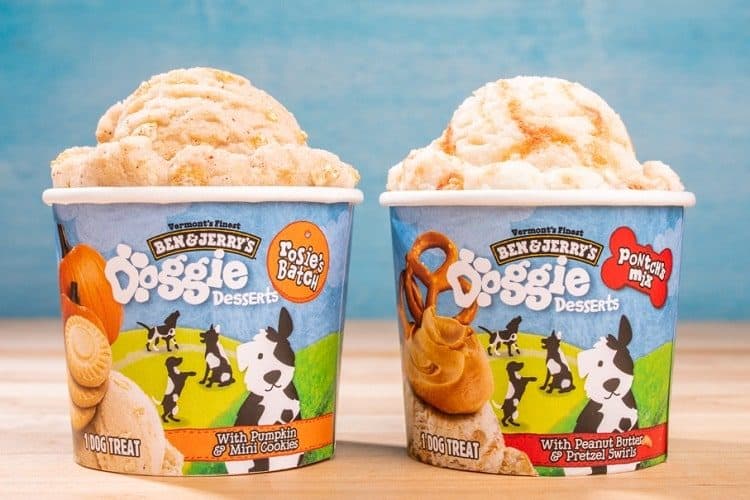Ben & Jerry’s is the latest well-known company to join the ranks inside the pet treat industry, as well as the pet care industry, according to its recent press release. Ben & Jerry’s announced two new flavors of ice cream – made exclusively for dogs. Now pups everywhere can enjoy Vermont’s notorious ice cream in a canine-safe fashion. With the pet food and treat industry climbing in sales every year, Ben & Jerry’s has thrown its hat into the ring of a booming business.
Specially formulated to be safe for dogs, Ben & Jerry’s offers doggie ice cream made with a sunflower butter base. Named after two dogs from the Ben & Jerry’s offices – a Frenchie and a mixed breed rescue – “Pontch’s Mix” and “Rosie’s Batch” give dogs a cool treat option with ingredients like peanut butter (no xylitol) and pretzel swirl, and pumpkin with miniature cookies swirled throughout.

Photo courtesy: Ben & Jerry’s
Ben & Jerry’s, as well as Vermont, has long been dog-friendly. The office dogs are affectionately known as K9-5ers since they hang out with their owners during business hours.
“We know our fans love their dogs and treat them like family,” said Lindsay Bumps, a Ben & Jerry’s Global Marketing Specialist, also a certified veterinary technician. “We created this product line so pups can enjoy something even better than belly rubs. Doggie Desserts are the sweetest treat they’ll ever put their paws on.”
Over the last ten years, pet market sales of pet food and treats climbed from $19.85 billion to $38.4 billion, marking consistent growth in the pet industry, according to Statista. Global market sales in pet treats are expected to reach $72.6 billion by the year 2027, according to Business Wire.
But it’s not just pet treats that Ben & Jerry’s is creating. The company has also launched its first pet care products. Ben & Jerry’s has partnered with suppliers to offer pet accessories, such as leashes made from recycled materials and a stuffed toy made from recycled fill – shaped, of course, like an ice cream cone.

Photo courtesy: Ben & Jerry’s
Also on the rise are sales in CBD supplements and treats for dogs – 11 percent of owners used CBD for their dogs in 2019, according to Statista. And with Ben & Jerry’s news release of CBD-infused ice cream coming soon to stores near you, perhaps CBD-infused Doggie Desserts ice cream is next on the company’s list.
Ben & Jerry’s Doggie Desserts are sold in 4-ounce mini cups and 4-count multipacks. They can be found in supermarkets, retailers, and other pet stores nationwide.
Located in the mountains of Vermont, Ben & Jerry’s first opened its doors in Waterbury in 1985. Considered Vermont’s finest ice cream, Ben & Jerry’s prides itself on using only the best ingredients. From non-GMO to fair trade ingredients, Ben & Jerry’s strives to reach and maintain Vermont’s goal of renewable energy.
Other companies have long been on board with doggie cool treats, such as Frosty Paws, a well-known doggie ice cream found in most supermarket freezers. Brands such as Pooch Creamery, Puppy Scoops, Smart Scoops (made with goat’s milk), and Hoggin’ Dogs, available on Amazon, offer a powdered version with a variety of flavors. Simply add water, mix, and freeze for a delicious doggie ice cream treat.
The Bear & The Rat: Cool Treats for Dogs began in 2010, and recently landed its doggie frozen yogurt in Whole Foods in 2019, according to The Denver Business Journal. Just like Ben & Jerry’s and Frosty Paws, The Bear & The Rat comes frozen and is made with limited ingredients, with flavors like bacon and peanut butter, banana, and peanut butter and banana.

Photo courtesy: The Bear & The Rat Facebook Page
Most doggie ice creams are formulated with canine-safe ingredients, staying away from real milk or cream, since it’s not uncommon for dogs to be lactose-intolerant. According to Krista Williams, BSc, DVM and Robin Downing, DVM, CVPP, CCRP, DAAPM of the VCA, dogs may have an adverse reaction to lactose, which can include symptoms such as diarrhea, vomiting, abdominal discomfort, bloating, or gas.
Some dogs may also have an adverse reaction to additives in doggie ice cream, but the veterinarians warn there isn’t much evidence, and an additive reaction is considered unlikely. Likewise, some dogs could have a histamine reaction to the ingredients, while some dogs may have an actual food sensitivity to dairy, which typically results in skin and GI symptoms.
The American Kennel Club offers do-it-yourself recipes for cool doggie treats, such as frozen yogurt, pupsicles, and peanut butter molds. This allows dog owners to control the ingredients in their doggie ice cream.







